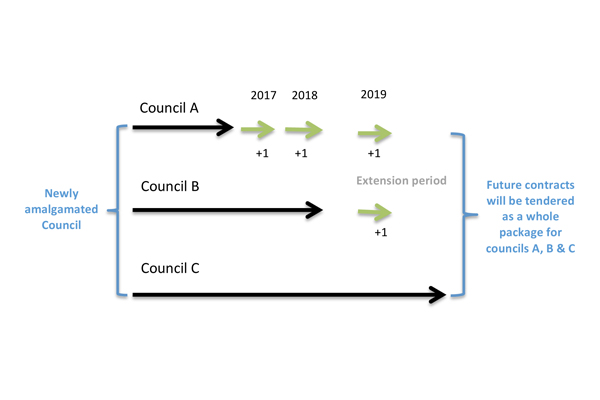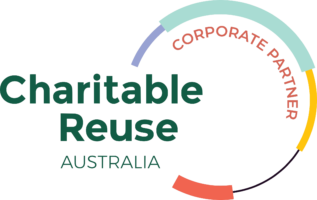NSW Council amalgamations and the waste contract pathway
By Dr Ron Wainberg – Technical Director and Kiera Crosariol – Environmental Consultant, MRA Consulting
Some NSW councils are about to amalgamate; as a result, the councils affected will have to plan for eventual integration of their residential and commercial waste services.
Waste management often represents the largest long term contractual commitment for a Local Government Area (LGA), and the level of service provided during periods of transition are crucial for sustaining resident approval.
As individual councils join, they will have to consider how they are going to manage waste management services for their new and expanded local community.
Challenge 1 Harmonising Service Types
Most council services are bespoke and service their particular community differently. The size and type of bins used can vary significantly between neighbouring councils and can include combinations of the following non-garbage services:
- Recycling:
- Crates;
- Drop off centres;
- Paper and cardboard bins; and
- Containers (comingled) bins.
- Organics:
- Bundled verge clean ups;
- Mulching services;
- Food trial bins;
- On-site processing;
- Home composting;
- Garden organics bins; and
- Food and garden organics bins.
To complicate things further, councils have also adopted different methods and frequencies for collection, and have unique hard waste management contracts in place.
Waste services can be a polarising topic and is politically charged. Residents can react strongly to changes to their waste collection services without proper consultation.
Challenge 2 Contract Timing
Waste collection and disposal contracts will terminate at different points in time, and finding a pathway for their integration into one master contract covering the entire amalgamated LGA will require careful consideration and planning.
There are a number of factors to be considered:
- Existing contract requirements including contamination rates and waste characterisation;
- Maximum number of extensions and their duration;
- Inclusion or exclusion of change in law clauses;
- Compliance with the Local Government Act;
- Existing collection schedules and how routes will change under one contract;
- Types of mobile waste bins;
- The size and number of bins to distribute;
- The current hard waste collection options available; and
- The existing processing contracts for all waste streams and facility capacity.
The Path Forward
The duel challenge is to manage resident expectations and the timing of the service integration. Proactive councils that consult with their community and conduct comprehensive research into best practice, particularly for hard waste collection, are more likely to minimise community concern.
Councils should determine if they are able to exercise optional contract extensions and enter into transitional arrangements that see each part of the newly amalgamated council integrated into one master contract over time. It is important to note that waste service providers can happily work within a staggered contract. Furthermore, the purchase of new trucks or bins is assisted by a staggered commencement date.

It is a myth that all contracts have to start and finish together. Contracts can be developed that allow for the phased incorporation of different areas within a single contract or to progressively bring various services ‘inherited’ from the previous councils into one integrated service or to leave them independent.
MRA can assist with community consultation, designing an optimum service model for the amalgamated LGA, and developing appropriate contract specifications so that the transition is as seamless as possible for both residents and council.
This article has been published by the following media outlets:




